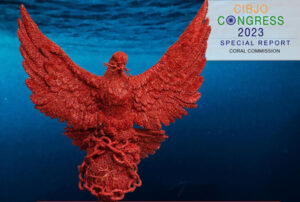 With fewer than two weeks to go to the opening of the 2023 CIBJO Congress in Jaipur, India, on October 3, 2023, the ninth of the pre-congress Special Reports has been released.
With fewer than two weeks to go to the opening of the 2023 CIBJO Congress in Jaipur, India, on October 3, 2023, the ninth of the pre-congress Special Reports has been released.
Prepared by the CIBJO Coral Commission, headed by Vincenzo Liverino, the report considers the continuing knowledge gap prevalent not only among consumers, but also among large parts of the industry, which leads many to conflating precious coral species with other varieties, among them reef corals afflicted by global warming and ocean acidification.
In the report, Liverino stresses the importance promoting accurate coral terminology, as listed in the CIBJO Coral Blue Book, which limits precious coral only to three groups – all of which belong to the Corallidae family – Corallium, Pleurocorallium and Hemicorallium.
This definition for precious materials rules out the majority of coral species, including those that can occasionally be seen in decoration, which are defined by CIBJO as ‘common corals, he states, adding that the Blue Book definition also rules out thousands of other species, including those shallow-water reef corals that have been facing the extreme stress of climate change.
“Communicating these trade definitions is critical, since many industry colleagues and consumers are under the erroneous impression that the corals found in jewellery are sourced in colonies located in shallow waters, like the Great Barrier Reef,” Liverino writes. “The corals defined by CIBJO as precious live in totally different ecosystems, and in much deeper and colder waters.”
The tendency to cluster together all types of coral was reflected a decision taken more than 10 years ago by the authorities in Thailand, which banned all trading in the material after the magnitude 9.0 Great Tohoku earthquake off the coast of northeastern Japan on March 11, 2011. The devastating tsunami that followed considerably damaged the local reef coral ecosystem.
“CIBJO has been reaching out to the authorities, requesting that they consider the fact that the species affected by the natural disaster are not those used as gem materials in jewellery manufacturing, which is a very strong industry in Thailand,” the Coral Commission President notes.
“We have pointed out that precious corals do not live in the same ecosystem as those that were impacted by the tsunami, and, according to CITES, are not considered endangered species.”